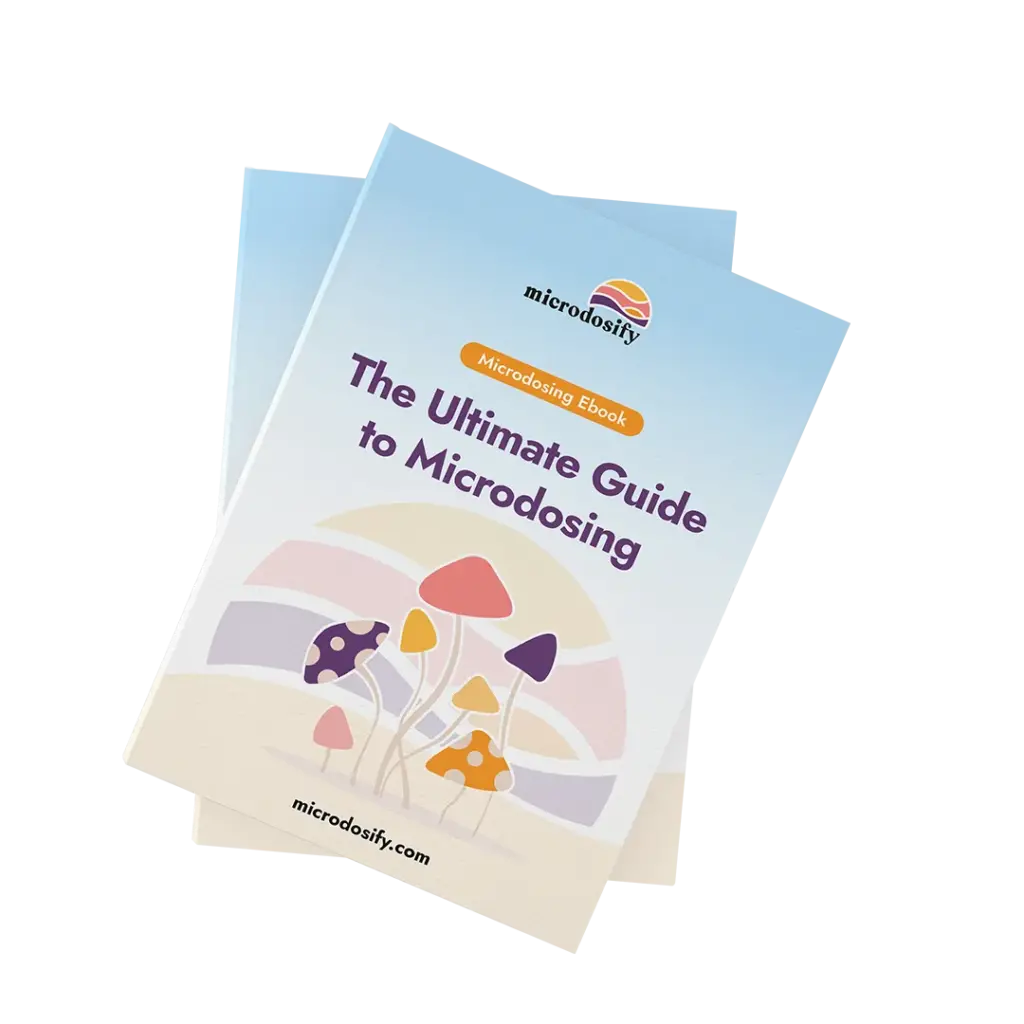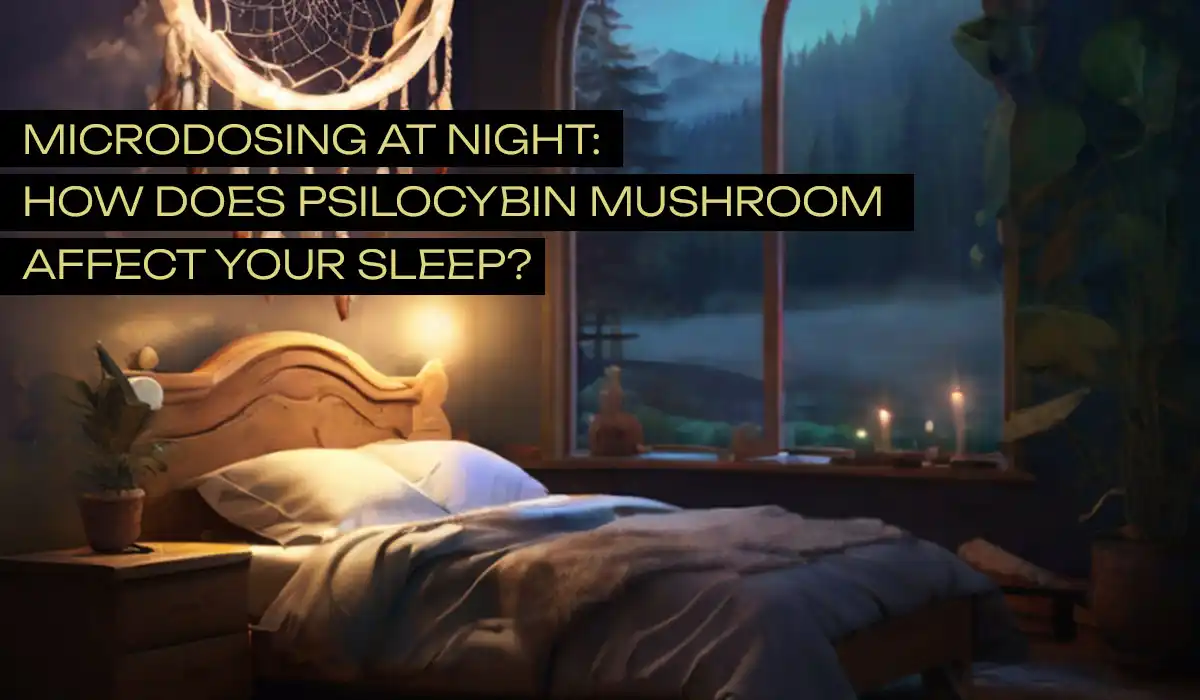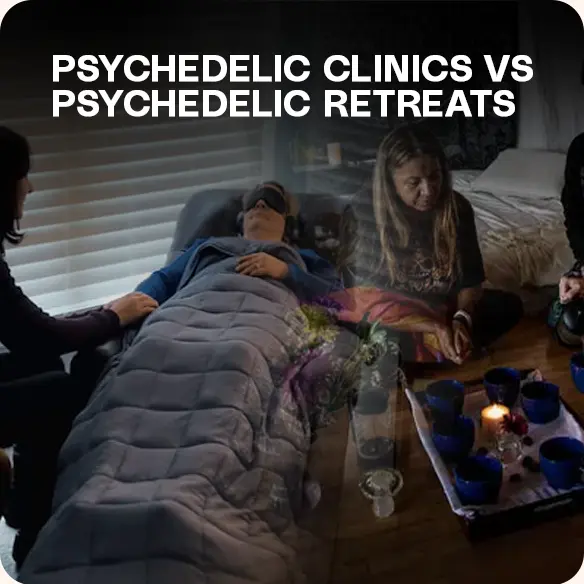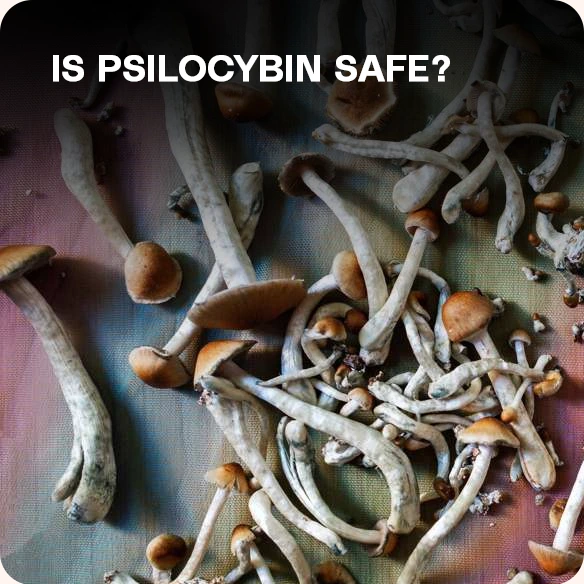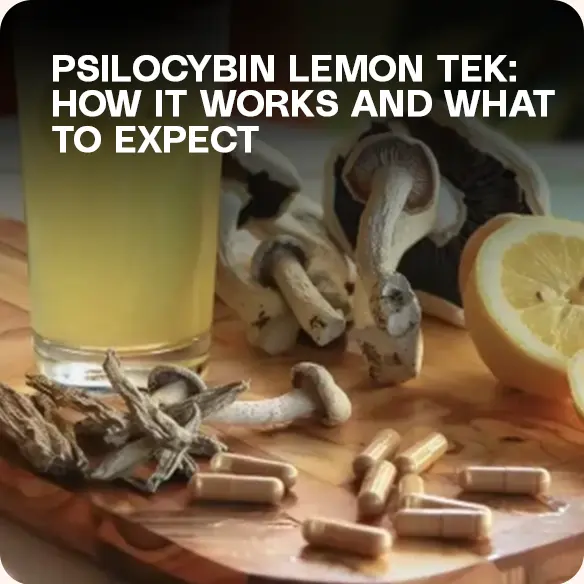Some individuals report that microdosing at night helps with stress reduction and improves sleep quality, while others experience REM disruption, vivid dreams, or insomnia after taking psilocybin in the evening.
Scientific research on psilocybin’s effects on sleep is still emerging. Preliminary studies suggest psilocybin may alter REM latency, modulate serotonin pathways, and impact the default mode network (DMN) — all of which influence how well you sleep.
What Happens If You Microdose Psilocybin at Night?
Microdosing psilocybin mushrooms at night can affect sleep in both helpful and disruptive ways, depending on factors like dose, timing, your individual biology, and mental state.
Psilocybin impacts serotonin receptors (5-HT2A), which regulate not only mood but also the sleep-wake cycle. It can also modulate activity in the brain’s default mode network (DMN) — influencing emotional processing and dream states during sleep.
Reports suggest that some people feel more relaxed and sleep better after nighttime microdosing, while others experience restlessness, vivid dreams, or trouble falling asleep.
Timing matters: taking psilocybin too close to bedtime may stimulate the mind and interfere with normal sleep cycles.
How Does Psilocybin Impact Sleep Quality and Sleep Cycles?
Psilocybin increases serotonin, which can initially boost alertness and change how your body transitions between sleep stages.
Existing research suggests that psilocybin’s psychedelic properties may alter perception and cognition, ease major depressive disorder and mood disorders, improve mental health, and potentially influence sleep quality and duration.
Timing the ingestion of psilocybin mushrooms for optimal sleep results requires careful consideration, as taking them too close to bedtime may disrupt the natural sleep cycle.
However, further research is necessary to understand the intricate interactions between psilocybin and sleep and determine the most effective timing to minimize any potential disturbances to sleep patterns.
Does Microdosing Help You Sleep — or Cause Insomnia?
The answer depends on dose, timing, and personal sensitivity.
For some, low-dose psilocybin can reduce pre-sleep anxiety, promote calm, and improve sleep onset, especially when taken earlier in the evening.
For others, nighttime microdosing may cause:
- Restlessness
- Difficulty falling asleep
- More intense or vivid dreams
- Increased nighttime awakenings
If you’re experimenting with microdosing for sleep, start at a low dose and track your personal response. Avoid taking it too close to bedtime (within 2–3 hours of planned sleep).
For more on managing dosage: see Magic Mushroom Dosage 101.
Can Microdosing Psilocybin Help You Sleep Better?
Psilocybin microdosing offer some sleep-related benefits:
- Stress Relief → Helps quiet the mind before bed
- Reduced anxiety → Linked to improved sleep onset
- Influences circadian rhythms → May stabilize sleep-wake cycles
- Enhanced mindfulness & relaxation → Fosters a calmer pre-sleep state
- Pain relief → Chronic pain sufferers report easier sleep
- Dream recall → Some users experience vivid, meaningful dreams
See full article on Benefits of Microdosing
Research on microdosing and its effects on sleep patterns has uncovered a fascinating link.
A recent study by MindBio Therapeutics indicated that individuals who microdose with psilocybin may enjoy an extra 24 minutes of sleep the day after microdosing.
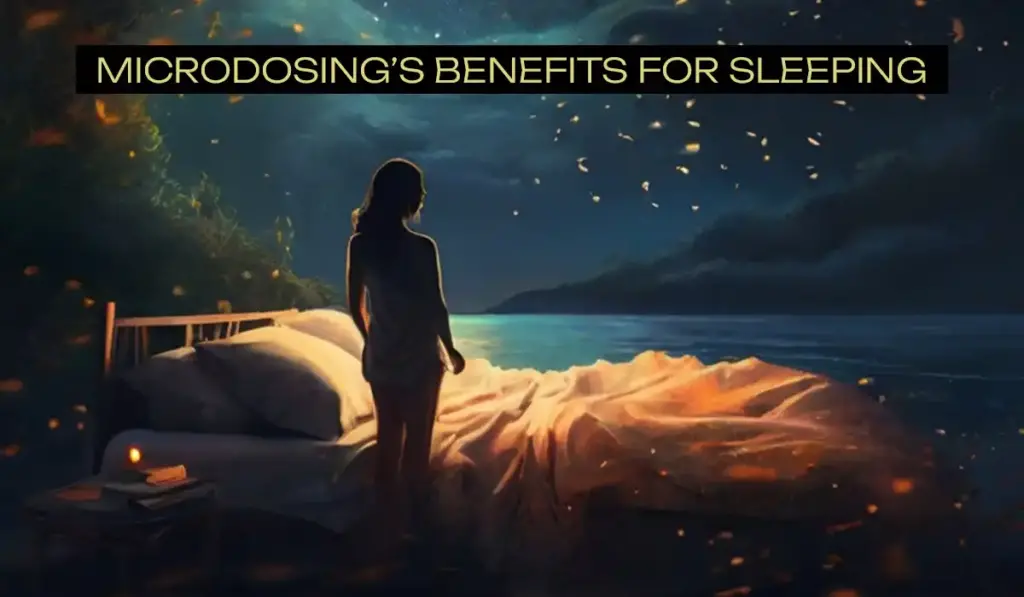
Taking a small amount of psilocybin appears to have a subtle impact on sleep duration, prompting inquiries into its influence on the natural sleep-wake cycle.
If you’re looking to ease into a sustainable routine, the 30-Day Microdosing Experience Program offers a guided microdosing protocol that can help you track changes in sleep, mood, and overall well-being.
Is It Safe to Microdose Psilocybin at Night?
It is unclear whether microdosing at night is a bad idea.
According to the Microdosing Institute, microdosing magic mushrooms using the nightcap protocol may improve sleep quality for some individuals and make them feel refreshed in the morning.
Some users who follow the nightcap protocol have reported more restful sleep and emotional clarity the next morning. If you’re curious to try a sleep-supportive blend, our CALM capsules are made to promote sleep, reduce anxiety, and support deep nighttime restoration.
However, some nighttime microdosers have reported experiencing the following risks: unpredictable effects, disrupted sleep patterns, vivid dreams and nightmares, increased anxiety and paranoia, and impaired judgment and coordination.
- Unpredictable Effects: Psilocybin affects individuals differently based on factors such as dosage, tolerance, and mental state. Taking shrooms before bed may lead to unpredictable and intense psychedelic experiences, potentially overwhelming some users.
- Disrupted Sleep Patterns: Psilocybin may interfere with normal sleep cycles, causing difficulties falling asleep or experiencing restful sleep. This disruption can result in fatigue and grogginess the following day, impacting daily activities.
- Vivid Dreams and Nightmares: Shrooms can enhance dream activity, leading to vivid and sometimes unsettling dreams or nightmares. This heightened dream state may contribute to a restless night, affecting overall sleep quality. These effects may overlap with known REM disruption patterns, as detailed in our guide on microdosing for insomnia which explores how timing and dosage can impact sleep cycles.
- Increased Anxiety and Paranoia: The hallucinogenic effects of psilocybin can amplify existing anxiety or induce feelings of paranoia. Taking shrooms before bedtime may intensify these emotions, potentially negatively affecting mental well-being during the night.
- Impaired Judgment and Coordination: Psilocybin can impair cognitive functions and coordination. Taking shrooms before bed may increase the risk of engaging in activities requiring alertness and sound judgment, such as navigating the bedroom or bathroom at night.
These effects can vary greatly between individuals. If you’re new to microdosing, be aware of the potential for challenging experiences or bad trips and start with caution.
When Is the Best Time to Microdose Psilocybin for Sleep?
The best time to take shrooms varies based on individual preferences. Some favour daytime for heightened visual experiences and a connection with nature. Others opt for nighttime to embark on introspective and spiritual journeys in a more tranquil environment.
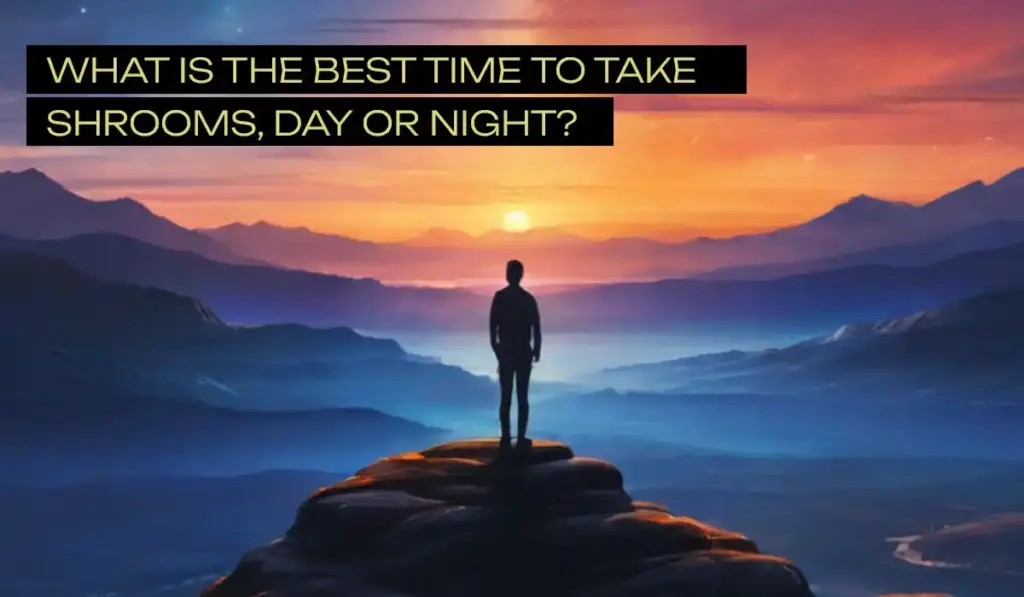
The pros of taking mushrooms during the day include enhanced visual experience, outdoor exploration, social interaction, and easier integration.
- Enhanced Visual Experience: Daylight can intensify colours and sharpen visual perception, creating a more vibrant and immersive daily experience (microdosing at a small dose should not induce hallucinations)
- Outdoor Exploration: Daytime allows for outdoor activities like hiking or nature walks, fostering a deeper connection with nature.
- Social Interaction: Daylight hours provide opportunities for social interaction, potentially leading to shared insights and a sense of communal exploration.
- Easier Integration: Daylight provides a cleaner environment for processing and integrating the experience, potentially aiding in reflection and personal growth.
Cons of taking shrooms during the day include overstimulation, visibility of strangers, and potential distractions.
- Overstimulation: Bright sunlight or city noises may lead to sensory overload, making some individuals feel overwhelmed or anxious.
- Visibility of Strangers: Increased visibility may raise concerns about encountering unfamiliar people, potentially causing paranoia or discomfort.
- Potential Distractions: Daytime activities may introduce distractions that could divert attention from the introspective aspects of the experience. You can feel trippy at work as a result of mushroom consumption.
Pros of taking shrooms at night include enhanced introspection, reduced external stimuli, and easier light control.
- Enhanced Introspection: The quiet and darkness of the night can facilitate a more introspective journey, allowing for deeper self-reflection.
- Reduced External Stimuli: The absence of daytime distractions can lead to a more focused experience, allowing individuals to explore their inner thoughts without external interference.
- Easier Light Control: The night allows for easier control of lighting conditions, enabling individuals to create a comfortable and aesthetically pleasing environment.
Cons of taking shrooms at night include limited outdoor exploration and difficulty in integration.
- Limited Outdoor Exploration: Nighttime can restrict outdoor activities, limiting the potential for nature-related experiences.
- Difficulty in Integration: The lack of natural light may make it challenging to process and integrate the experience effectively.
Therefore, the best time for shroom consumption could be the daytime, provided that it has more pros than night.
Still unsure how psilocybin stacks up against other sleep supplements?
Our deep dive into nootropic vs magic mushrooms compares their mechanisms and effects on sleep, mood, and cognition.
Is Microdosing Psilocybin at Night Worth Trying for Sleep?
Psilocybin — the active compound in magic mushrooms — shows potential to support better sleep in some users. Microdosing may help reduce stress, promote relaxation, and improve overall sleep quality for certain individuals.
However, the effects can vary. In some cases, psilocybin may disrupt sleep patterns, especially when taken too close to bedtime or at incorrect doses. Users have reported both positive and negative outcomes — highlighting the importance of personal experimentation and caution.
As scientific research evolves, we are gaining a deeper understanding of how psilocybin interacts with sleep mechanisms. Until clearer evidence emerges, it’s best to approach nighttime microdosing with care — starting low, tracking responses, and consulting resources like our Microdosing for Insomnia Guide for practical tips.
FAQs
Can microdosing psilocybin at night help you sleep?
Microdosing psilocybin at night may help some people sleep better by reducing stress and promoting relaxation. However, effects vary and in some cases, psilocybin may disrupt sleep.
What is the best time of day to microdose psilocybin for better sleep?
Most experts recommend microdosing psilocybin earlier in the day to avoid potential sleep disturbances, though some users successfully follow the ‘nightcap’ protocol.
Can microdosing psilocybin cause insomnia?
In some individuals, microdosing psilocybin,especially too close to bedtime, may cause insomnia, vivid dreams, or restless sleep. Careful timing and dosage are important.
Does psilocybin increase REM sleep?
Studies suggest psilocybin may increase slow-wave activity but prolong REM sleep latency, potentially delaying deep REM cycles.
Is it safe to microdose psilocybin at night?
Microdosing at night is generally safe for healthy adults when using very low doses, but individual responses vary. It’s best to start with daytime microdosing and track your sleep patterns.
